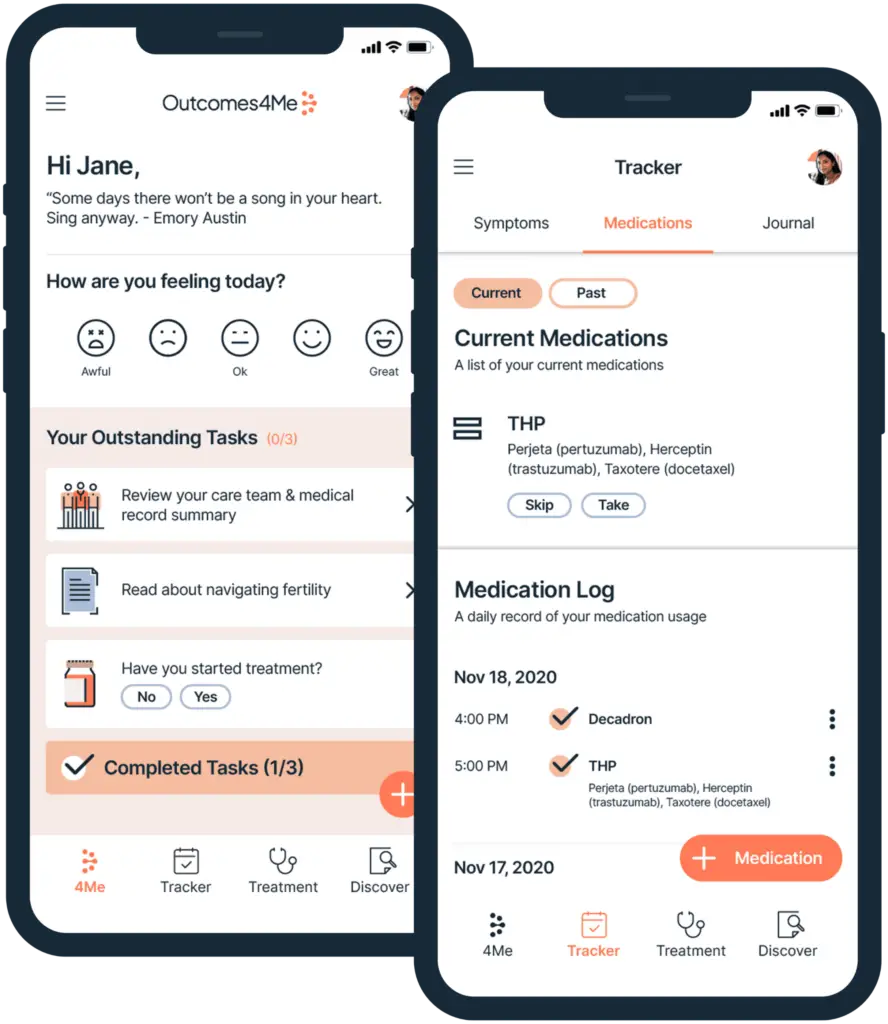Outcomes4Me Secures $21M in Funding Learn more >>
Outcomes4Me Secures $21M in Funding Learn more >>
Suzanne Garner
Cancer Survivor, Outcomes4Me User

We’re the only non-metastatic stage 2 breast cancer app that integrates with the NCCN Clinical Practice Guidelines in Oncology (NCCN Guidelines®), from the not-for-profit alliance of 33 leading cancer centers. The NCCN Guidelines® include comprehensive guidance related to all FDA-approved treatment options.
We gather non-metastatic stage 2 breast cancer treatment recommendations typically meant for oncologists and use Artificial Intelligence (AI) to translate that information so you can understand it, putting you in control. With this knowledge, you can feel empowered to make the best medical decisions with your care team.
With our free non-metastatic stage 2 breast cancer app, you’ll get:


Gain direct access to personalized treatment options so you can have more informed conversations with your care team.

Rely on us to help your patients get access to the best non-metastatic stage 2 breast cancer care and resources, and save time in your day. We’re here to help and won’t ever get in the way.

Accelerate patient access to your treatments and expand the reach of your non-metastatic stage 2 breast cancer research and clinical trials.
Get all the information you need to take a more active role in treating your non-metastatic stage 2 breast cancer.












The overall 5-year relative survival rate for stage 2 breast cancer is around 93% and the 10-year survival rate is estimated to be around 88%. It is important to note that many factors influence overall survival rates including the tumor risk group, treatment and lifestyle. Other factors such as ER/PR status and Her2 status also play a role in overall prognosis.
Overall no, stage 2 breast cancer is not typically considered advanced. Based on breast cancer staging guidelines (TNM) stage 2 breast cancer is considered early or localized, meaning the tumor size is small and contained to the breast or only a few lymph nodes in close proximity to the breast. Stage 2b breast cancer, which has spread to local lymph nodes, may be considered to be locally advanced breast cancer.
The risk of recurrence for Stage 2 breast cancer is lower than for stage 3 or 4 when considered more advanced. However there is a possibility that stage 2 breast cancer can recur either locally in the breast or nearby lymph nodes or to another spot in the body. The overall 5-year relative survival rate for stage 2 breast cancer is around 93% and the 10-year survival rate is estimated to be around 88%. It is important to note that many factors influence risk of recurrence including the tumor risk group, treatment and lifestyle. Other factors such as ER/PR status and Her2 status also play a role in overall prognosis.
Based on breast cancer staging guidelines (TNM) stage 2 breast cancer is considered early or localized, meaning the tumor size is small and contained to the breast or only a few lymph nodes in close proximity to the breast. The overall 5-year relative survival rate for stage 2 breast cancer is around 93% and the 10-year survival rate is estimated to be around 88%. It is important to note that many factors influence overall survival rates including the tumor risk group, treatment and lifestyle. Other factors such as ER/PR status and Her2 status also play a role in overall prognosis.
The primary treatment for stage 2 breast cancer is removal of the tumor via surgery. This can be done in one of two ways, breast conserving therapy is a partial mastectomy or lumpectomy which leaves the breast intact, or a full mastectomy may be performed. The choice of therapy is individual and depends on several factors including the size and location of the tumor within the breast, whether the lymph nodes are involved and patient goals of therapy.
Most people with stage 2 breast cancer will be offered chemotherapy either before or after surgery to help reduce the risk of recurrence. Several factors could influence the decision to pursue chemotherapy including tumor size, location of the tumor within the breast, the presence or absence of markers such as ER/PR and Her2, as well as individual prognostic scores from additional testing that may be performed. According to the NCCN guidelines, adjuvant chemotherapy is generally recommended for most patients with Stage 3 breast cancer.
The overall 5-year relative survival rate for stage 2 breast cancer is around 93% and the 10-year survival rate is estimated to be around 88%. It is important to note that many factors influence overall survival rates including the tumor risk group, treatment and lifestyle. Other factors such as ER/PR status and Her2 status also play a role in overall prognosis.
https://www.cancer.org/cancer/types/breast-cancer/understanding-a-breast-cancer-diagnosis/breast-cancer-survival-rates.htmlhttps://www.ncbi.nlm.nih.gov/books/NBK482286/#:~:text=Stage%200%20and%20stage%20I,%25%20and%2072%25%2C%20respectively.
https://www.cancer.org/cancer/types/breast-cancer/understanding-a-breast-cancer-diagnosis/stages-of-breast-cancer.html
https://www.cancer.org/cancer/types/breast-cancer/understanding-a-breast-cancer-diagnosis/breast-cancer-survival-rates.html
https://www.ncbi.nlm.nih.gov/books/NBK482286/#:~:text=Stage%200%20and%20stage%20I,%25%20and%2072%25%2C%20respectively.
https://www.cancer.org/cancer/types/breast-cancer/treatment/treatment-of-breast-cancer-by-stage/treatment-of-breast-cancer-stages-i-iii.html#:~:text=Stage%20II%20cancers%20are%20treated,lymph%20node%20dissection%20(ALND).
https://www.cancer.org/cancer/types/breast-cancer/treatment/treatment-of-breast-cancer-by-stage/treatment-of-breast-cancer-stages-i-iii.html
https://www.cancer.org/cancer/types/breast-cancer/understanding-a-breast-cancer-diagnosis/breast-cancer-survival-rates.htmlhttps://www.ncbi.nlm.nih.gov/books/NBK482286/#:~:text=Stage%200%20and%20stage%20I,%25%20and%2072%25%2C%20respectively.
By clicking the “Subscribe Now” button you’re agreeing to our Terms of Service and Privacy Policy.